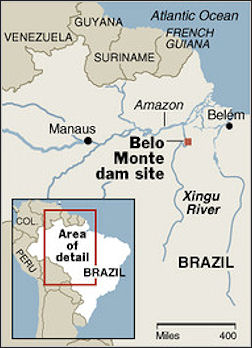I had mixed reactions to Alexei Barrionuevo‘s 4.10 N.Y. Times story about James Cameron‘s visit to a section of Brazil’s Amazon jungle populated by the Na’vi-like Arara tribe, who live along the Xingu River. Once there Cameron stated his opposition to the proposed Belo Monte dam, which “would flood hundreds of square miles of the Amazon and…devastate the indigenous communities that live along it,” Barrionuevo reports.

What I mean is that it feels “right” and a tiny bit weird at the same time. What is environmentalism if you don’t stand up and do something along the lines of what Cameron is attempting? And yet there are faint echoes of hubris in the image of a rich American director flying down to Brazil and proclaiming that a genuine life-or-death, money-and-greed situation is a reflection of a creative vision that led to an enormously successful film.
Cameron’s heart is obviously in the right place, and I agree with his likely assessment, which is that the dam is a stand-in for unobtanium, the Avatar MacGuffin. Meaning that the dam probably is an arrogant initiative by a relatively small group of government bureaucrats who are looking to favor (and be greased by) certain contractors, and with zero regard for the blight it will bring about.
What American settlers, railroads and legislators did to American Indians in the mid to late 1800s, today’s Brazilian government is doing to tribes like the Arara.
“The snake kills by squeezing very slowly,” Cameron said to more than 70 indigenous people during his recent visit. “This is how the civilized world slowly, slowly pushes into the forest and takes away the world that used to be.”

Why, then, did I ask myself certain questions after reading this story? Most of them having to do with the contrast between a clean cinematic narrative and the mucky-muck of real-world political maneuver. Avatar is one thing, but this is real — can Cameron or any other rich, committed environmentalist (or environmental group) really stop the dam?
We’re trained to believe that when “progress” wants to step in, nature has to back off….but does that always have to be the case?
Cameron is right to see this as an Avatar-like situation, but what would the reaction be if the Arara went all Na’vi on the dam builders and took some workers out with poison darts? Is the Belo Monte dam completely about unnecessary corruption, or is there an economic upside that at least mitigates the situation? If so, is there a more ecologically responsible or compassionate way to bring power to the region?
Movies are movies, but life is a little more gnarly and complicated.









